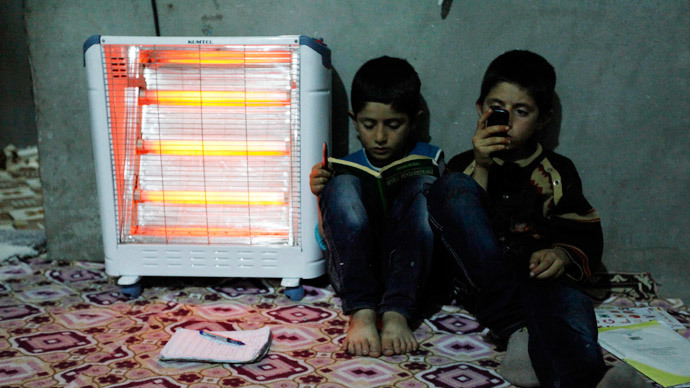1.1mn working households in England plagued by fuel poverty

Over a million households in England are unable to heat their homes adequately, despite having one or more members in work, a leading British think tank warns.
Sobering research by Policy Exchange, a think tank working for improved public services and a more buoyant economy, revealed 1.1 million households across the nation are plagued by fuel poverty despite having at least one working individual. This figure amounts to half of all fuel poor homes in England.
Policy Exchange’s study indicates fuel poverty is a complex issue affecting a diverse range of people from pensioners to low-income workers. Soaring energy bills and swathes of energy inefficient homes increase the problems. Between 2003 and 2013, consumer gas prices have risen by 128 percent.
Many 'can't afford to heat homes' http://t.co/H0VuL5ScSC@paenvironment on new @Policy_Exchange report out today pic.twitter.com/3BXmwzYehY
— ECIU (@ECIU_UK) January 9, 2015
The study, which examined a total of 2.3 million fuel poor English homes, found those who live in the least energy efficient houses would need to spend up to £1,700 annually to heat their properties properly. The issue is most serious in detached, older homes, particularly those based in rural areas.
Some 30 percent of fuel poor people in England are couples with children, 17 percent are single adults under the age of 60, 15 percent are single parents and 12 percent are couples over the age of 60, the research suggests.
Some 49 percent who can’t afford to heat their homes work, while 12 percent are unemployed, the research indicates.
Our infographic provides a breakdown of people in #fuelpoverty in the UK. See more at http://t.co/kHPc1V1ucppic.twitter.com/5EJO8CoXa7
— Policy Exchange (@Policy_Exchange) January 9, 2015
Policy Exchange’s report highlights a growing disconnect between the government’s pledge to bolster the energy efficiency of fuel poor homes and the sum of money currently being channeled into tackling the issue. The think tank says a colossal £700 million-a-year funding gap exists.
Policy Exchange says the spending gap cannot be addressed by increasing taxation in a continued era of economic uncertainty, financial struggle, and “squeezed household budgets.”
Rather, it suggests the government can meet the spending requirements while remaining within “existing budgets” by introducing several new policies.
The think tank suggests “energy efficiency subsidies” should focus more on households struggling with fuel poverty.

It also proposes the state’s Winter Fuel Payment scheme should operate under an “opt-in” system, as only 10 percent of current Winter Fuel Payment recipients are actually fuel poor. Such a move could free up £400 million annually, which could be redirected into making fuel poor homes more energy efficient, the report argues.
Finally, Policy Exchange says energy efficiency should be viewed as a “national infrastructure priority.” This would enable the government to tap into a sizeable £100 billion pool of infrastructure funding between now and 2020.
The report’s author, Richard Howard, said people often assume the elderly are most vulnerable to fuel poverty, but this view only portrays part of the picture.
“There are over one million working households struggling to afford their energy bills and living in under-heated homes,” he said.
“Improving energy efficiency is clearly the most cost-effective way to tackle the problem.”
In October 2014, campaign and advocacy group Fuel Poverty Action put forward an Energy Bill of Rights in the House of Commons. Its primary sponsor was Green Party MP Caroline Lucas.

The Bill, which outlines people-centered policies to bring an end to the nationwide scandal of fuel poverty, was welcomed by the House on October 23.
The proposed legislation backs a nationwide campaign for the right to access affordable energy, the right to energy that does not pose a risk to the climate or local environment, and the right to energy efficient housing.
It has so far gathered the signatures of 63 MPs.












